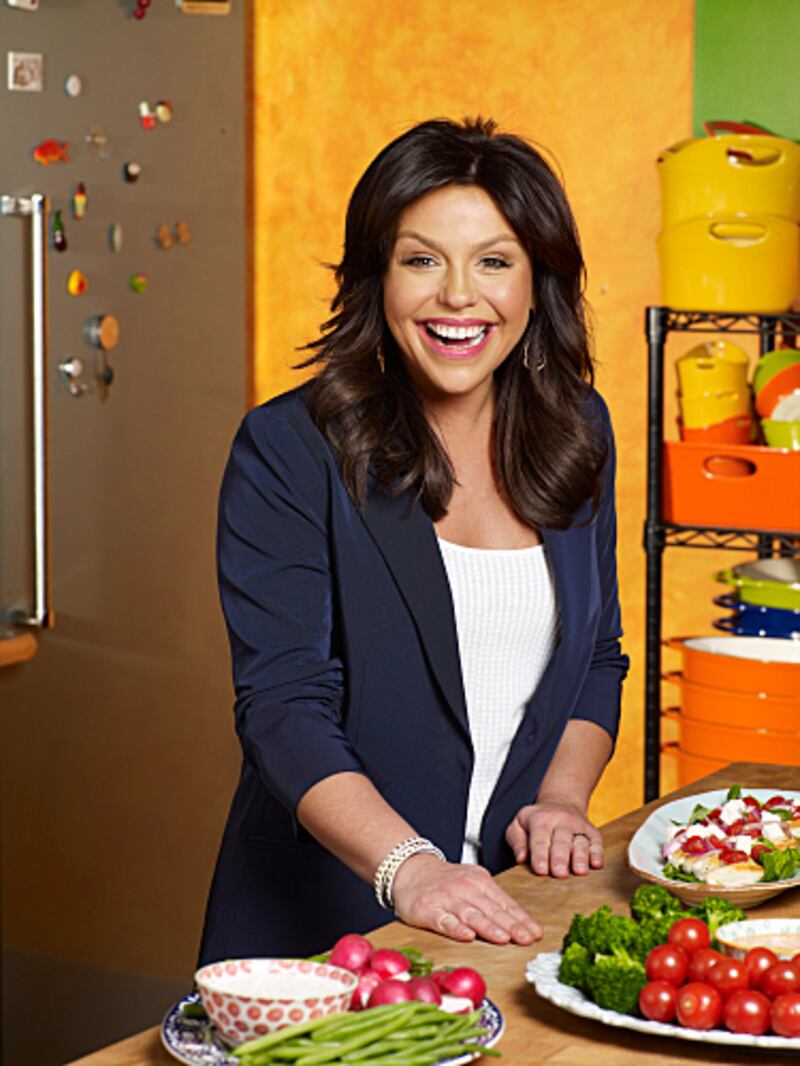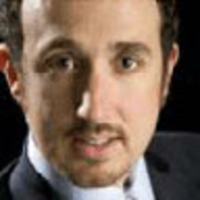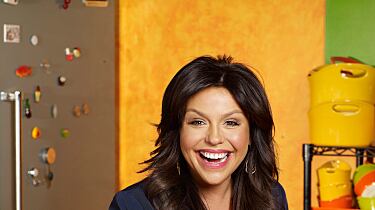The talk show host and cookbook queen takes on stuffy foodies Thursday with her Burger Bash at the South Beach Wine and Food Festival. In the latest Innovator Interview, Randall Lane talks with Ray about her non-training, job insecurities—and why Martha Stewart never calls.
Over the past few years, Rachael Ray effectively turned herself into the greatest multiplatform personal lifestyle brand since Martha Stewart, from a magazine ( Everyday with Rachael Ray) to a dozen-plus cookbooks to TV, where she currently hosts programs on the Food Network, the Cooking Channel and an eponymous daytime talk show that’s half Ellen, half Julia Child.

All of it from a woman with no formal cooking training whose self-described goal is to help people whip up something “yum-o” in 30 minutes or less. On Thursday, Ray hosts the Burger Bash, the kick-off—and high point—of the South Beach Wine and Food Festival. Newsweek/The Daily Beast’s Randall Lane chatted with her about the makings of Rachael, Inc.
ADVERTISEMENT
If you had to sum up your brand in a sentence or two, how would you do that?
Can-do accessibility. I want people, whatever they read in the magazine, or the cookbook, or whatever they see on the television show—I want them to feel like they can touch it, be a part of it and feel like they can be successful at it or with it.
When it comes to product design, I like to be innovative first and foremost, and value-driven. It doesn’t have to be inexpensive, but it has to be a great value compared to things of similar construct. And the design has to be completely original. I love Microplanes, for instance, and people will ask me all the time, why don’t you make your own version of a Microplane? Because I didn’t come up with the idea, it’s not my thing. I don’t want to rip off other people’s great ideas. I invented the pasta pot because, you know, spaghetti is long. And I love being able to talk about that and get behind that.
I use all of my products in my home, I test drive everything before I put my name on it, so I like it to be smart or functional.
Who’s your role model as you’re doing this?
My mother taught me that you don’t have to be rich to have a rich life, because that’s the way that she was raised. She’s very adventurous. She’d spend her last couple of bucks on taking us to Vermont and letting us go to a flea market or letting us play in an apple orchard for a day because that, to her, was as relevant as saving for a rainy day, or getting the bills paid on time.
And I like that feeling. Teaching people that if they make dinner for themselves or for their loved ones, that it feels good on the inside and it makes your day feel richer than eating out of a box or going to a crappy restaurant. It’s about a quality-of-life thing, not having to wait until you retire to enjoy some of your time.
I’m grossly, grossly, grossly undertrained for everything I’ve ever done.
Well, I was thinking more about a business role model.
My mother worked 100 hours a week before women worked, never bitched about it, was always happy to work harder than the next 10 men and was always lovely to the customer. The customer was always right, and she always had a smile, even if she was screaming at someone for screwing up on the job. And that would be the same person she would pat on the back and say “good job” the next time they did something great.
In your Rachael Ray empire, which is your favorite kind of project?
I love everything because it brings me together with a group of people who are like-minded. A lot of people who work here—the Food Network, the daytime show, a lot of people who work with me on the business development and developing the Web and the Web business used to be with me at the magazine. It’s a real family sort of community vibe and there’s a lot of crossover people and overlap people. I just like being around people who have the same sensibilities.
I also love all the merchandise lines because we use them in a very unique way. I have a children’s initiative that eradicates hunger as a scholarship program, a lower obesity program, an animal rescue organization—we help out mom-and-pop shelters, no-kill shelters, all the way up to huge organizations.
I love the animal charities for such a high-profile carnivore.
I had a pit bull. She was my first dog. Boo passed on, but she taught me so much about life and about loving that I just fell in love with the breed.
What do you like better? Talking or cooking? Your show has both.
I like both at the same time. I like telling stories and most of the great stories in my life are tied to food because food was so central to our family life and my mother’s work life and home life. I’m very comfortable doing both at the same time. It’s probably my favorite thing.
Do you ever compare notes with Martha Stewart?
I don’t. [laughs] She’s never offered. I certainly would.
It just seems you guys have similar career arcs. Different brands, different kind of styles, but you’re both about brand consistency as you expand.
Absolutely. I think we’re both very dedicated to our cause and our scene. For Martha, she likes to set a very beautiful and very exquisite and very high standard and that’s really important. And for me, I want people to know they can achieve it. So I literally set the bar lower as part of our brand. I think that both work and both are very necessary.
You say you’re a cook, not a chef.
Absolutely. I didn’t spend a day in culinary school. I’m grossly, grossly, grossly undertrained for everything I’ve ever done. But I think that’s what’s important to our brand also. I think that reiterating that often reminds people that anyone in one way or another can be Rachael Ray, literally.
On Thursday, you kick off the South Beach Wine and Food Wine Festival with your annual Burger Bash. It’s the huge hit of the New York festival, too. What’s the genesis of that?
I love showing people that the world’s greatest chefs can be accessible and that food should bring people together and have a sense of humor. I love that some of the greatest chefs on the planet Earth want to convey that message by showing up, getting behind the flames, covered in sweat. They do it for bragging rights—who gets the big trophy, or the trip to Amsterdam thanks to Amstel—but also the love of it, to express that being a chef is not about being perfect or being aloof, but also love, community, sharing, laughter. Everybody can get into a burger and a beer.
That’s your sensibility, for sure. You have all these catchphrases—“yum-o”, “oh my gravy” and whatnot. How do you guys come up with them? Do you and your staff sit around cooking them up?
Well, I’ve got to tell you, I talk all the time. It just happens. You get exhausted. It’s the end of a four-week taping schedule here, where we shoot three shows a day, by the end of a run like this, I start to lose my voice. I get the exhaustion cold, where you’re sniffly and achy, you feel like you’re hitting your wall—and you get a little goofy. And goofy things fall out of your mouth or you shorten it up just to crack a joke and it ends up sticking. So most of them are just by accident or most of them happen when you’re just trying to repeat yourselves.
You’re always smiling. That seems key to your brand. Is that intentional?
I’m the luckiest girl in the world. I have a job that literally defines what I do on a day off from a real job. I love to chat and I love to cook and that’s really all I have to do for a living. I don’t have to unload trucks anymore, I don’t have to cook up 120 pounds of chicken for the front case because the chef didn’t come in, I don’t have to unload 1,000 boxes because it’s Christmas season at Macy’s.
What I’m doing now, including 260 hours of television a year, is by far the biggest physical load I’ve ever had in my life. But physically it’s nowhere near as demanding as the restaurant business or retail food.
So you just keep smiling right through it.
Baby, I don’t care what they say on TV, I still feel we are living in the throes of a recession and I will take as many damn jobs as they offer me until I’m dead. [laughs] I will work until my customer says stop.
That doesn’t change with a few million bucks?
No way.
Randall Lane is editor at large at The Daily Beast. The former editor in chief of Trader Monthly, Dealmaker and P.O.V. magazines, and the former Washington bureau chief of Forbes, he is the author of The Zeroes: My Misadventures in the Decade Wall Street Went Insane.






